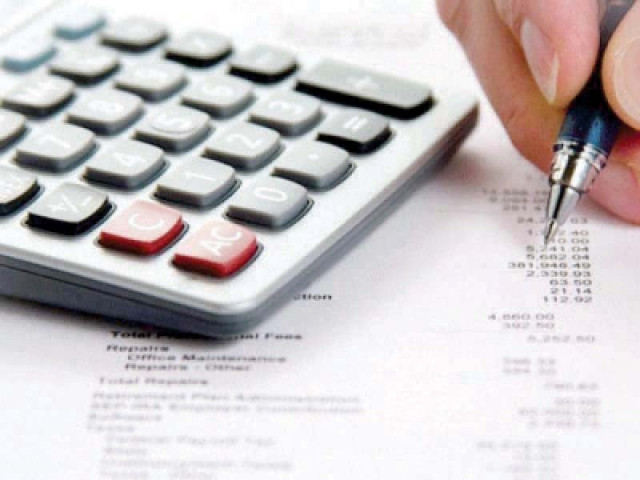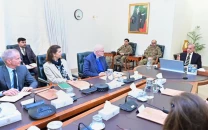Rs200b mini-budget to appease IMF on cards
Rupee will have to be left to market forces as global lender may not be pleased with mere new taxes

The government may impose taxes to the tune of Rs200 billion – with effect from next month – aimed at breaking a deadlock with the International Monetary Fund (IMF).
However, the current uncertain political situation in the country is causing a delay in taking a final decision in this regard.
The move came after the global money lender asked Pakistan to honour its commitments and take measures to bridge the revenue shortfall of nearly Rs220 billion that surfaced by the end of the first half (July-December) of the current fiscal year.
Read PM in last-gasp bid to revive IMF talks
Finance Minister Ishaq Dar has started taking meetings on the new budgetary proposals, including expanding discussions on the power tariff increase. Dar took meetings on the weekend in Lahore after returning from Dubai where no progress could be made on selling the state assets to the UAE.
Earlier, the government’s plan was to only impose taxes on imports as well as on commercial banks to generate about Rs80 billion for the rehabilitation of flood victims. However, government sources said that the list has been further expanded, which includes substantially increasing the capital value tax rates on imported and locally assembled vehicles, sugary drinks and petroleum products.
Prime Minister Shehbaz Sharif was expected to take a briefing at the weekend in Lahore but due to his political engagements, the meeting could not take place. The political uncertainty coupled with the increasing unpopularity of the PML-N is a reason behind the reluctance to take new measures.
Pakistan will also have to let the rupee gain its real value, as the IMF may not be pleased with the mere imposition of new taxes. The official rupee-dollar parity is Rs228.35 but in the Hawala market, it is over Rs270.
Read More Stocks buoyant while darker forecasts emerge
The sources said that earlier the plan was to impose at least 1% to 3% flood levy on imports and a 41% additional income tax on banks’ foreign exchange-related earnings from January. But now the government is targeting the first week of February. It is not clear whether the government will bring one presidential ordinance or two.
The flood levy might not be treated as a money bill unless the speaker National Assembly declares it so. The changes in the Federal Excise Act, the Income Tax Ordinance and amendments in the sixth schedule of the Sales Tax Act will require bringing a money bill through an ordinance.
However, the Senate is in session and the government will have to prorogue it to introduce the ordinance.
The Federal Board of Revenue on Monday also reshuffled heads of some field formations, including removing Dr Aftab Imam, Chief Commissioner of Medium Taxpayers Office, Karachi, due to his poor performance. He has not been given any new charge. In his place, Yousif Hyder Shaikh, has been made the chief commissioner of the tax office.
About three years ago, the FBR had also decided to take action against Imam due to his irregular action of giving a 36-month salary as a reward without following laid-down procedures. As a chief commissioner, he went on to disburse Rs21.2 million to his favourites but the FBR never took this matter to the logical end.
The FBR also posted Khurshid Marwat as chief commissioner of the Regional Tax Office, Sargodha.
Also Read Dear stakeholders, don’t push economy off the cliff
Despite a steep revenue shortfall, Finance Minister Ishaq Dar said last week that the government will stick to the FBR’s annual Rs7.470 trillion tax target. This is not possible without additional revenue measures of at least Rs200 billion
Against the Rs7.470 trillion tax collection target, the sources said that the IMF has anticipated Rs420 billion shortfall. But the FBR has lately claimed that it will face only Rs170 billion to Rs180 billion shortfall, which appears on the lower side.
The sources said that the government was reviewing the possibility of either reintroducing the sales tax on petroleum products or further increasing the petroleum levy rates over and above the current maximum threshold of Rs50 per litre.
In the case of petrol, the government has already achieved the maximum petroleum levy threshold of Rs50 per litre. For the January 16-31 fortnight, the Oil and Gas Regulatory Authority had recommended Rs1 per litre cut in petrol price. Since there was no scope to further increase the prices, the government increased the oil marketing companies’ profit margins by the same amount.
But it increased the petroleum levy rate by Rs2.50 per litre to Rs35 in the case of high-speed diesel. The petroleum levy rates on kerosene oil increased toRs6.22 per litre and light diesel oil Rs30 per litre.
After the revision in rates, the government is now expecting to collect over Rs40 billion in the second fortnight of the current fiscal year –a net increase of Rs1.1 billion in 15 days due to upward adjustment in levy rates.
The collection of the petroleum levy will remain lower than the annual target of Rs855 billion. The government is now facing pressure from the IMF to enhance the levy rates to increase the collection. Similarly, there was also a demand by the IMF to reintroduce the GST on petroleum products to cover revenue shortfall against the FBR’s targets.
The sources said that there were also discussions to increase the federal excise duty rates on aerated water and sugary drinks from the existing 13%. It may go up to 20% but no final decision has been taken yet about the rates.
Also Read MNAs bemoan govt’s apathy towards plight of economy
In addition to that, the government is already in the process of imposing a flood levy on imports and an income levy on the foreign exchange earnings of the commercial banks. The net additional tax on the banks' foreign exchange earnings could be 41%, excluding the taxes that they are already paying on their income.
The government was also considering withdrawing sales tax exemptions including on import of raw materials, components, parts and plant and machinery by registered persons authorised under the export facilitation scheme.
The 17% sales tax could be slapped on imported goods temporarily imported into Pakistan, meant for subsequent exportation charged to zero-rate of customs duty.



















COMMENTS
Comments are moderated and generally will be posted if they are on-topic and not abusive.
For more information, please see our Comments FAQ